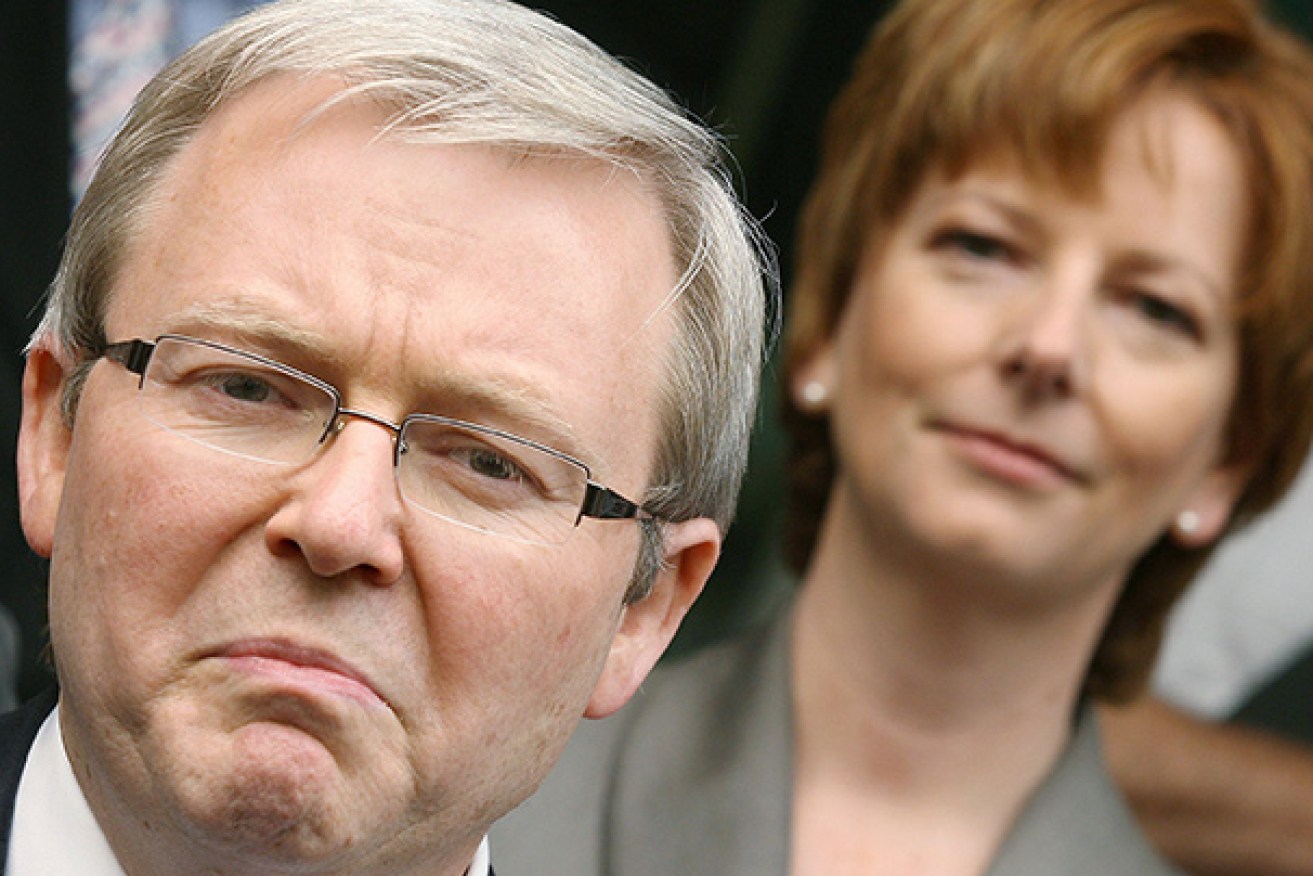The Killing Season: how a dream team imploded


ABC
The Rudd and Gillard Labor governments are the great riches to rags story of Australian politics.
When Kevin Rudd won the prime ministership in 2007, he was only the third Labor leader to take the ALP from opposition to government since World War II, and he did it by deposing Australia’s second-longest serving PM at the peak of an economic boom.
He was an unlikely candidate to do it. Mr Rudd was an outsider in political terms, a Labor politician without deep ties to the union movement whom Shadow Treasurer Chris Bowen said was “not from central casting for a Labor leader”.
• Security guards ‘spied on’ Sarah Hansen-Young
• Bikies, murderers sent to Christmas Island
• Doctors could be jailed for telling you this
As journalist Sarah Ferguson explains in The Killing Season, a new ABC documentary series on the bitter personal feud that defined and ultimately ruined the Rudd-Gillard years, Mr Rudd presented himself to voters as a leader attuned to the times.
Promising to be an economic conservative, married to a wealthy businesswoman and presenting as a Mandarin-speaking former diplomat, Mr Rudd convinced the electorate he was ‘Howard-lite’, a safe option after 11 prosperous years of the conservative government.
It should have been the beginning of a golden age of Labor rule. As veteran political journalist Paul Kelly writes in his account of the Rudd-Gillard years, Triumph and Demise:
Consider Rudd’s achievement: he defeated the Howard Government, saw Howard lose his own seat and had the sucessor, Peter Costello, foreshadow his own exit. Rudd became a giant killer; at the one poll he eliminated both Howard and Costello. He had the power to ruin the Liberal Party for a decade at least.
While we all know how this story ends, The Killing Season traces how a new generation of national leadership turned hope and early success into inglorious failure in just one term of parliament.
After the election, Mr Rudd’s decisive leadership warded off the worst effects of the GFC and he watched the demise of new Liberal leader Malcolm Turnbull, who was forced to step down after calling for the resignations of the PM and Treasurer on the basis of a fraudulent email from a Treasury official.
But even in the earliest, happiest days of the Rudd reign, the seeds of destruction were being laid.
The pink batts scheme, the school building program, rhetorical over-reach on climate change, a preference for media performance over good process – while the smiling PM was saving the nation and being adored, concern was rising among his colleagues about his management style.
An imperceptible turning point came when he appointed Mark Arbib (a member of the New South Wales right) to assist Ms Gillard (from the Victorian left) in the rollout of the stimulus packages. Mr Arbib had backed Mr Rudd’s rise. During his election victory speech Mr Rudd described Mr Arbib as his “great friend”.
But less than three years later the same man would back the factional move which deposed a sitting PM and install his previously loyal deputy as his successor.

Rudd and Gillard rarely saw eye to eye in the latter years. Photo: Getty
Pressure on the government continued to rise as claims of waste began to dog the stimulus programs. Young men died installing government-funded insulation. An asylum seeker crisis on a customs ship raised further questions of political management.
“More than anything,” Ms Gillard tells interviewer Sarah Ferguson, “the Oceanic Viking told me where our decision-making processes had degenerated to.”
The pressures of government began to test Mr Rudd’s control and complaints about incompetence from senior ministers who had been excluded from the elite decision-making group – which became known as the ‘gang of four’ – began to emerge publicly.
While the details of this period are fascinating to relive, the heart of The Killing Season is the dispute between two former allies who consummated a political marriage of convenience with one of the great election victories only to destroy one another in full view of the Australian voter.
Testament to their hostility are the wildly differing versions of events which defined their governments.
In one instance, Ms Gillard recounts a parliamentary tactics meeting that didn’t go Mr Rudd’s way. She claims it led to a “menacing, angry” encounter which bordered on physical intimidation.
Mr Rudd dismisses it as a lie. “Utterly false. Utterly, utterly false,” he says.
A contest over the past is not uncommon among former Labor prime ministers. Bob Hawke and Paul Keating remain in dispute over who masterminded the period of nation-changing reform in the 1980s. Theirs is a disagreement over glory.
For Mr Rudd and Ms Gillard, however, it is a disagreement over who is to blame.
The first episode of ‘The Killing Season, The Prime Minister and his Loyal Deputy’ airs on Tuesday 9 June at 8.30pm on ABC. More here.








